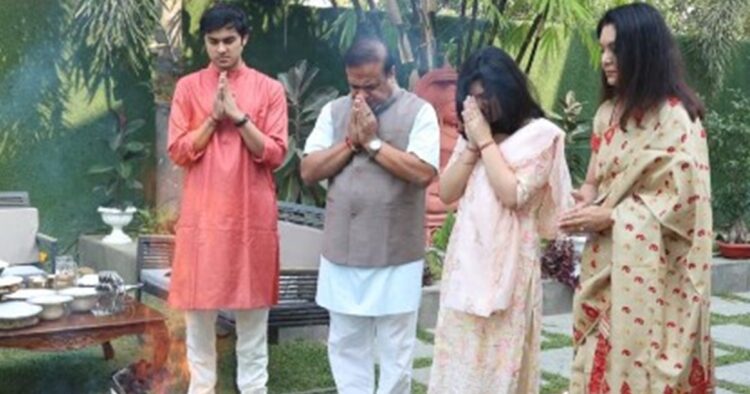Prime Minister Narendra Modi, Assam Chief Minister Dr Himanta Biswa Sarma, Union Ministers Sarbananda Sonowal and Amit Shah and BJP chief JP Nadda have extended warm greetings to the people of Assam, asserting Bhogali Bihu as more than a festival, but a profound socio-cultural custom and identity for the Assamese community.
Extending his cordial greetings, PM Modi wished for a time “filled with hope and happiness” for the people of Assam and wished may they get hope and joy from “the beauty of nature’s harvest”.
Dr Himanta expressed his heartfelt prayers, hoping the flames of Meji (bonfire) will shield everyone from adversities and usher in a period of peace, prosperity, and happiness. The Meji’s fire, symbolizing the triumph of light over darkness, carries a message of victory.
Wishing all a joyous Magh Bihu, Dr Himanta envisioned the Meji’s flames eradicating societal evils and spreading the pure essence of happiness, peace, and immense prosperity through positive energy. He wished further may the abundant golden crops in fields and barns illuminate the nation’s life and strengthen the bonds of harmony among all.
JP Nadda extended warm greetings for Magh Bihu, praying that the festival becomes a catalyst for health, happiness, and success in everyone’s lives.
Meanwhile, Amit Shah conveyed heartfelt wishes to the sisters and brothers in Assam, hoping this harvest festival showers blessing of happiness and prosperity upon everyone.
In a media interaction, Sarbananda Sonowal underscored the significance of festivals in shaping an individual’s identity, handed down through many generations.
Bhogali Bihu, also known as Magh Bihu, represents the rich socio-cultural ethos of Assam, culminating the harvest season with vibrant celebrations in mid-January.
Sonowal actively participated in the festivities, igniting the traditional Meji bonfire in Guwahati on January 15, symbolizing gratitude for the abundant harvest.
The festival is deeply rooted in agriculture, with the burning of Meji followed by communal feasts showcasing Assam’s gastronomic heritage. Beyond harvest celebrations, Bhogali Bihu fosters social bonding, with communities coming together to reinforce their cultural identity and shared values.
Preceding the main event, Uruka, marked by communal revelry in makeshift huts called Bhelaghar, allows people to engage in traditional activities, share Bihu songs, and partake in games. Bhogali Bihu is part of the trio of Bihu festivals unique to Assam, each corresponding to different agricultural phases.
The festival extends beyond its agricultural roots, serving as a vibrant expression of Assamese culture through the energetic Bihu dance and songs resonating with nature and social themes. Despite evolving times, Bhogali Bihu remains a unifying force, transcending religious and social divides.

















Comments